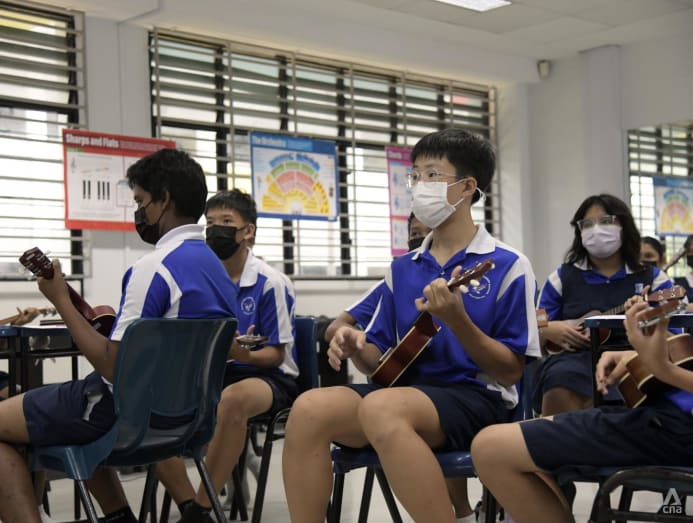Mixed form classes, new friends: What full subject-based banding could look like when it kicks in next year
"Whether you’re in Express, Normal (Academic) or Normal (Technical), we’re all just friends when we’re playing football at the field," says one student.
SINGAPORE: For most people, fond memories of school revolve around friends in the same class. With full subject-based banding, this may change – but could also mean new friends from different classes across subjects.
Ahead of full subject-based banding kicking in next year, the Ministry of Education (MOE) organised a visit for journalists to Jurong West Secondary School, where students have been offered subjects at a higher level for a few years.
Each student has a form class that they go through Secondary 1 orientation with. They also take subjects like music, physical education and art together.
But for core subjects like mathematics, science, English and mother tongue, they get a new mix of classmates based on the level that they take the subject at.
Jurong West Secondary accepts students from the Express, Normal (Academic) and Normal (Technical) streams.
With full subject-based banding, students can choose to take different subject levels, known as G3, 2 and 1 - G stands for General. These are broadly mapped from today’s Express, N(A) and N(T) standards respectively.
On Wednesday morning (Feb 22), students from 2 Excellence, 2 Passion, 2 Innovation and 2 Care were going through algebraic questions in an Express-level math class.
Students in the N(A)-level math class next door - also from 2 Excellence, 2 Passion and 2 Innovation - were going through simultaneous equations.
Some of the students in the Express-level class entered the school at the N(A) level, and still take other subjects at a G2 level.
For 14-year-old Ong Qi Qi, she started out in Secondary 1 taking only English at the Express level because she did well in the subject in her Primary School Leaving Examination (PSLE).
But at the end of her first semester, she was offered the option to take mathematics and mother tongue at the Express level after doing well in those subjects. She took the opportunity and joined a new class after her first six months with the school.
“Mother tongue I’m still struggling, but English and maths I still can cope,” she shared.
Qi Qi was happy when she received the letter about taking the new subjects at a higher level. “Because I know there’s a chance for me to go Express fully,” she said.
She is aiming to take science at the Express level at the end of the second semester this year, and hopes to take her humanities subjects at a higher level from Secondary 3.
“I met new people and when I don’t know how to do things, I felt very nervous and I cannot ask them how to do,” she said, adding that this got better after she got to know her new classmates.
“It’s very fun because at first we don’t know what stream they are from. So our vibe is the same, because we are in the same class, and we just bond by talking and laughing.”
For students like Qi Qi who move from the N(A) level to Express level, teachers often conduct a bridging course for the subject to help them get up to speed with certain topics that might not have been taught at the lower level.
Giving students the opportunity to take subjects at a higher level gives them more confidence, said biology and English teacher Ms Domina Ng.
“They do realise that there are strengths that they have, they may be weaker in certain areas, but they do have strengths,” she added.
“This applies to every single student out there, and it’s just that now it’s a little bit more flexible in terms of giving them that ability to really choose what interests them and what they’re strong in.”

GETTING STUDENTS TO MIX
After the bell rang at 11.40am, signalling a new period, students from 2 Excellence filed out of the room and made their way to another classroom for music lessons. The form class reunited to practise familiar tunes like Despacito on the ukulele.
When streaming is removed from 2024, all students in schools that accept different bands of students will see mixed form classes, Education Minister Chan Chun Sing announced in 2022.
In 2023, about 90 schools, or more than two-thirds of secondary schools, have implemented full subject-based banding.
It takes some effort to get the students to open up to their new classmates in their subject classes at the start of the year, because they are more familiar with the friends that they have gone through orientation with in their form classes, said PE and geography teacher P Vinoth.
“When I tried to make the lessons interesting, energetic, it’s a bit difficult, because of this awkwardness between students,” he added.
“So I have to intentionally plan a lot of bonding activities, group activities, mini competitions between the students for them to get them to know one another before the class actually becomes lively.”
When they come into class in their teaching groups, students don’t even know where to sit, said Ms Ng.
Group work and intentional seating arrangements to ensure that students from different classes are seated together helps, she added.
To help the students bond and work together, she helped her class set a common goal - to pass and move on to Secondary 2 together. During group work, she also changes up the groupings often so that the students get to know each other.
“Initially, you start to see that they are very uncomfortable sitting with each other because they don’t really know each other, but subsequently you have to establish ground rules with them, and get them to actually participate in setting up the ground rules with you.”
When they switch to a new class, N(A) students who are offered a subject at the Express level will also need to know which class to go to, said Ms Yasmin Hussein, the Year Head for lower secondary students.
"So of course, there's some operational and logistics that we need to do, so during the first two weeks of school, all the subject teachers will fetch the students from their class and bring them to the other class," she added.
N(A) students taking an Express-level subject are also aware that they are taking the subject at a higher level, said Ms Yasmin, who also teaches Malay language.
"So we come together and we discuss to have this commonality that we are here studying the same subject, so you need to shape your mindset and understand that it's offered to you because you are just as capable," she added.
"I think currently, at this stage, we don't have that sort of stigmatisation in class. In fact, I told them it's not about achieving top grades in my class, I want to see progress," said Ms Yasmin, adding that she urges students to support and help each other.
Under the full subject-based banding model, students no longer differentiate each other according to their form classes, said Mr Vinoth.
“They start to mix and socialise with students from other form classes as well. So at the end of the year, usually it feels like another form class by itself because they are really supportive of each other.”
Ahmad Yasin Jofri, 14, from 2 Passion described taking classes under the full subject-based banding model as a “very eye-opening experience” where he gets to meet people from all sorts of backgrounds.
To accommodate the mixed form classes and having students from different classes in core subject classes, the school switched to a two-week timetable, which means students have a different timetable in odd and even weeks of the school year.
While he found the system confusing at first, he eventually got used to it. His classmates also remind each other to pack their bags for the correct timetable each week.
Ahmad also enjoys having a mixed form class, describing it as “quite fun”. He had heard from his seniors that in previous years, students from higher streams would have certain perceptions of students from the lower streams, and found that quite sad.
“I feel like the fact that we’re all in a mixed form class is a very good experience, because just because you’re from another stream doesn’t mean you cannot talk to other people,” he added.
“At our school, when it comes to having fun or mixing with one another, we don’t really care about what stream you’re in, whether you’re in Express, N(A) or N(T), we’re all just friends when we’re playing football at the field.”





